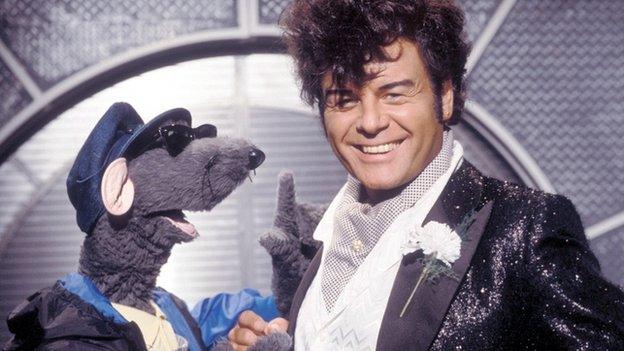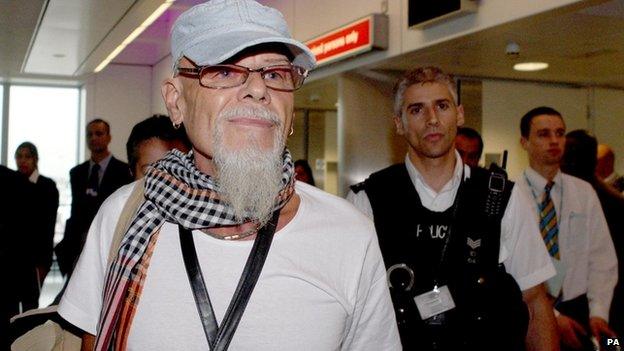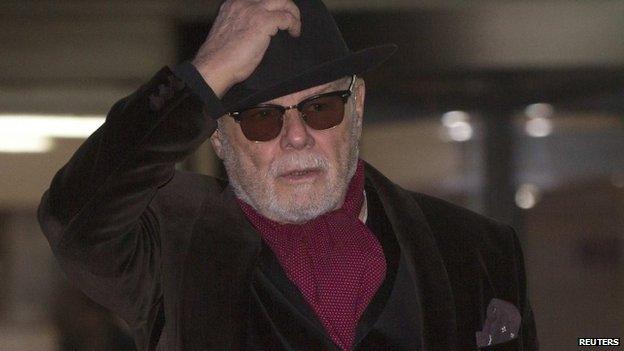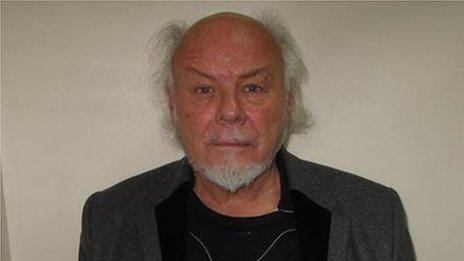Gary Glitter: Glamour rock star to paedophile
- Published

Gary Glitter, pictured performing on Top of the Pops in 1988, was one of glam rock's most glamorous stars
With his outrageous sequinned clothes, big hair and platform shoes, Gary Glitter was among glam rock's most glamorous stars.
But behind the image hid a darker side, which was slowly uncovered with a string of sex-crime convictions since 1999.
"At the height of his fame Gary Glitter was a very, very big pop star," Daily Telegraph chief music critic Neil McCormick said.
"He was always a slightly comical panto figure, and he was there on TV stomping around and having these hits that they were singing in playgrounds up and down the country."

Glitter's song Rock and Roll took him to second place in the charts in 1972
But, said Mr McCormick, with fame and adulation had come a warped sense of right and wrong.
"There was a notion that every rock star had complete impunity to commit the crimes, the moral crimes that nobody else in society were committing," he said.
"They were behaving like Vikings raping and pillaging across pop culture.
"Gary Glitter to me is a sexual predator who exploited the possibilities of what was there."

Glitter's I'm the Leader of the Gang (I Am) took him to the top of the charts for four weeks in 1973
For a few fleeting years Glitter, whose real name is Paul Gadd, had it all.
I'm the Leader of the Gang (I Am) took Glitter, now 70, to the top of the charts for four weeks in the summer of 1973.
Many who bought the single were teenage girls, overawed by a larger-than-life persona.
But as glam rock faded, Glitter's star was in decline.
By 1977 his popularity was fading and he was declared bankrupt, a situation Glitter told the court he put down to the high UK tax rate at the time and mismanagement by his business managers.
In 1999 came the revelation that was to lead to his spectacular fall from public favour.

Gary Glitter returned to the UK in 2008 after his conviction in Vietnam for molesting two girls aged 11 and 12
Glitter was jailed for four months for the collection of 4,000 images of child sex abuse. He was released in January 2000 after serving two months.
He fled to Cambodia but was permanently expelled from the country in 2002, although no specific reason was given for his deportation to Vietnam.
In 2006 Glitter was convicted for molesting two girls aged 11 and 12 and jailed for three years.
His sentence was reduced by three months, and he returned to Britain in August 2008.
But six years later, police officers working on the Operation Yewtree inquiry, sparked by allegations against the late BBC radio DJ and television presenter Jimmy Savile, encountered fresh evidence of sexual abuse by Glitter in the 1970s.
His trial heard graphic evidence of his abuse of three young girls, one aged less than 10.

Glitter's trial heard graphic evidence of his abuse of three young girls, one aged less than 10
Peter Saunders, of the the National Association for People Abused in Childhood, said the publicity surrounding such high-profile cases has touched a deep chord.
"The last couple of years, certainly since the Jimmy Savile scandal erupted, NAPAC has been deluged with calls.
"The distress seems to be building up as time goes on rather than dissipating, and I think that's because of the very high level of coverage of this issue."
In court, Paul Gadd seemed still to believe in his star status, as if he could not quite imagine the invincible figure of the glam rock era would ever be entirely forsaken.
During one of several costly attempts to revive his career that ended in failure, he revealed the same doomed optimism.
"I know they want to see me," he said.
"I only have to walk down the road and everybody is, 'Hi Gary!'"
- Published5 February 2015
